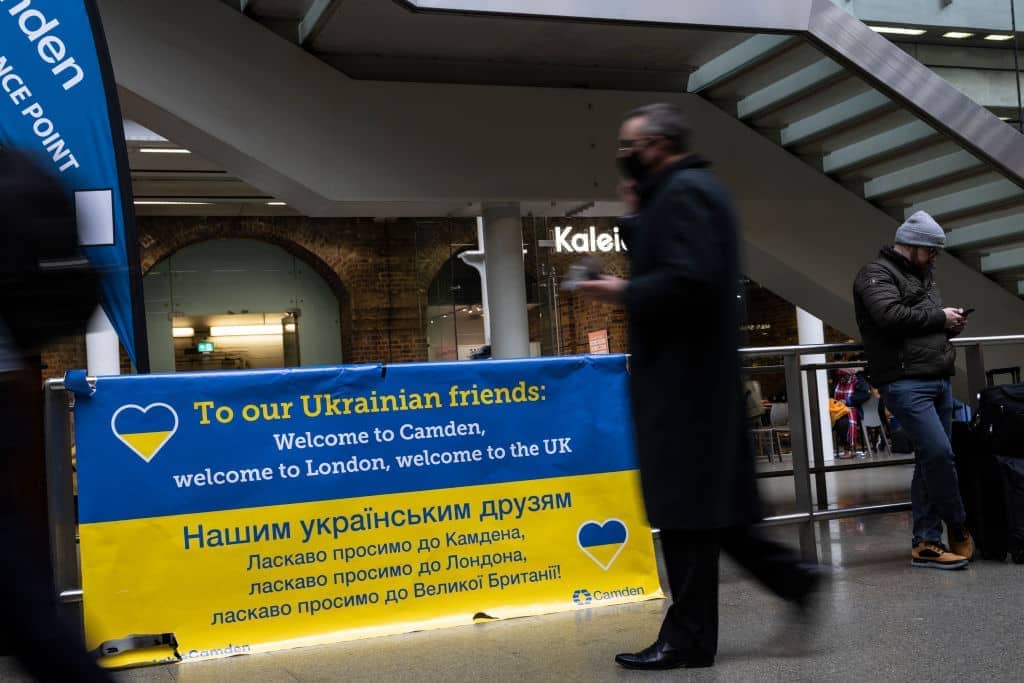Over the course of three days in September 1939, 1.5 million evacuees were sent to rural locations across Britain considered to be safe from the impending war. In a staggering logistical feat facilitated by thousands of volunteer helpers – from teachers to railway staff – children were swiftly relocated, with gas masks around their necks, suitcases in hand. Stately homes were given over for use as nursery schools. Local authorities attempted to provide a full-time education by finding alternative buildings – pubs, chapels and church crypts.
Contrast what was achieved over eight decades ago, where only a few wealthy families had phones and the web was the stuff of science fiction, with the news this weekend that officious councils are blocking UK homes for Ukrainian refugees because they have plug sockets that are too low, garden ponds, or the wrong type of plaster on their ceilings. Consider how, a few weeks ago, one sponsor application was unsuccessful because the property didn’t have central heating. How Justices of the Peace are undergoing DBS checks, their existing clearance deemed inadequate.
Meanwhile, the Home Office is processing parents and children separately, preventing them from travelling to their UK hosts’ homes. And, while hundreds of thousands of people in Britain have offered to host refugees under Homes for Ukraine, a rule preventing people applying to it once they are in Britain means they cannot benefit from these offers.
The Ukrainian refugee crisis has brought out British nit-picking bureaucracy and craven caution at its worst
The government introduced the Homes scheme after coming under fire from all sides for its begrudging response to the crisis. Three million people were made refugees by Putin’s invasion in just three weeks, and while other European countries went to great lengths to help, the UK was accused of resorting to bureaucratic trickery and foot-dragging to evade responsibility. The approach was badly out of kilter with the public mood: millions of pounds were donated to projects in Ukraine, collection points were being inundated. The scheme was supposed to end the shambles and restore the credibility of a nation that spent more than any other helping Syrian refugees.
Instead, we have an application form that stands at over 50 pages. A dedicated phone line has been described as a ‘waste of time’. Sponsors have complained documents have ‘disappeared from online applications’.
The Ukrainian refugee crisis has brought out British nit-picking bureaucracy and craven caution at its worst. Remember when the University of East Anglia banned mortarboard tossing, or one council banned kites on the beach? Just last week, residents of St Blaise in Cornwall were told daffodils would no longer be planted after a training course informed council officials that the flower can be toxic to humans if ingested.
But it speaks more to the incentive structures intrinsic in our society. Sure, councils aren’t yet draining every private swimming pool or pond in the land. But the UK now has a pernicious mix of US litigiousness combined with the regulatory culture of the EU. Council officials don’t want to get sued, they don’t want to get blamed, but they do want to expand their funding and their status.
This is not a call for recklessness, but rather a softer attitude to risk which may, conversely, save lives. By 7 April, just 40,900 visas had been issued for Ukrainians. A fraction of that number have made it to Britain through the scheme, while 12,000 have come through the family reunification pathway. In other parts of Europe refugees are travelling freely, arranging visas upon arrival. Large train stations on the continent are full of locals holding placards offering rooms and transportation.
Our approach has an appalling cost. Over the past week our attention has been diverted away from defensive weaponry and towards the human anguish wrought by this conflict. Boris Johnson became the first western leader to use the word ‘genocide’ after dozens of civilians were found dead in the Ukrainian town of Bucha. Last week, one newspaper told the harrowing tale of a grandmother who, after hiding in a neighbour’s cellar with her grandchildren, emerged to find a newly-dug pit in her garden. When she asked, a nearby Russian soldier told her: ‘This is a graveyard for you.’
None of this is to downplay the efforts of the Ministry of Defence, and the alacrity with which the UK has provided training, reinforced Ukraine’s defensive capabilities or imposed sanctions. There is a reason why Zelensky has this week urged leaders in the West to follow our example. But the government ought to be straining every sinew to get the Ukrainian people out of danger as quickly as possible. At the very least, the standards that would normally apply to renting a property ought to be loosened in the interest of accelerating their exit from a war zone. But it appears the opposite is happening.
While the experience of evacuees during the second world war was far from unequivocally positive once they reached their destinations, they at least were able to escape high-risk areas. We should not let bureaucracy deny the people of Ukraine the same opportunity.






Comments